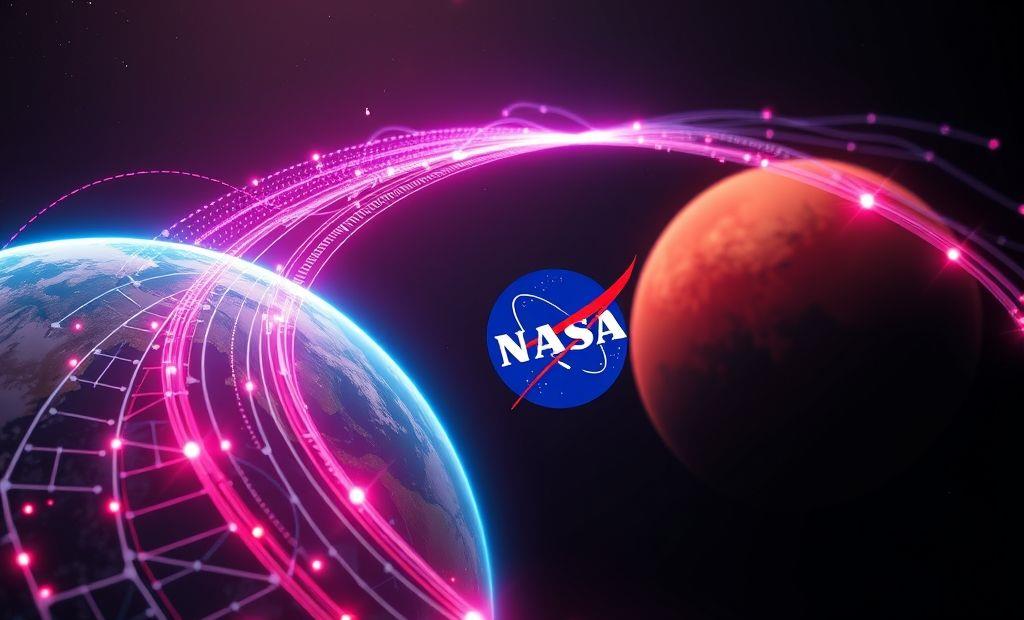NASA’s Mars Data Pipeline Ignites Tech Race

NASA’s Mars Data Pipeline Ignites Tech Race NASA’s ambitious missions to Mars are generating a tidal wave of data, sparking an intense race to develop...
⏱️ Estimated reading time: 2 min
Latest News
NASA’s Mars Data Pipeline Ignites Tech Race
NASA’s ambitious missions to Mars are generating a tidal wave of data, sparking an intense race to develop robust and efficient data pipelines. These pipelines are crucial for relaying scientific discoveries, high-resolution images, and other vital information from the Martian surface back to Earth. The challenge lies in the vast distances, limited bandwidth, and harsh conditions that demand innovative solutions.
The Data Deluge from Mars
As rovers like Perseverance and future missions explore Mars, the amount of data they collect continues to increase exponentially. NASA needs to transmit everything from detailed geological surveys to atmospheric measurements. Developing efficient and reliable data pipelines will determine how quickly and effectively scientists can analyze this wealth of information and make groundbreaking discoveries. This has led to increased interest from private companies and research institutions alike, all vying to create the most effective system.
Challenges in Building a Martian Data Pipeline
Several significant obstacles stand in the way of establishing a seamless data flow from Mars:
- Distance and Latency: The immense distance between Earth and Mars causes significant delays in data transmission.
- Limited Bandwidth: The available bandwidth for transmitting data is constrained, requiring efficient compression and prioritization techniques.
- Harsh Environment: Equipment on Mars must withstand extreme temperatures, radiation, and dust storms, demanding rugged and reliable technology.
Innovations in Data Transmission
Researchers and engineers are exploring several cutting-edge technologies to overcome these challenges:
- Advanced Compression Algorithms: Developing algorithms to compress data without significant loss of information helps maximize the use of available bandwidth.
- Laser Communication: Using lasers instead of radio waves offers the potential for much higher data transfer rates.
- Optimized Network Protocols: Designing network protocols specifically tailored to the unique conditions of interplanetary communication can improve efficiency and reliability.
The Future of Martian Data
The race to develop the data pipeline to Mars is not just about speed and efficiency; it’s about enabling future exploration and discovery. Improved data transmission capabilities will support more complex missions, real-time remote operations, and a deeper understanding of the Red Planet. As technology advances, we can expect even more innovative solutions to emerge, paving the way for a new era of Martian exploration. This will require collaboration between NASA, private companies, and academic institutions.
Related Posts
Bluesky Enhances Moderation for Transparency, Better Tracking
Bluesky Updates Moderation Policies for Enhanced Transparency Bluesky, the decentralized social network aiming to compete...
December 11, 2025

Google Maps: Gemini Tips, EV Charger Predictions & More!
Google Maps Gets Smarter: Gemini Tips & EV Updates Google Maps is enhancing user experience...
December 9, 2025

US, UK, Australia Sanction Russian Web Host
Crackdown on Russian ‘Bulletproof’ Web Host The United States, United Kingdom, and Australia have jointly...
December 6, 2025











Leave a Reply